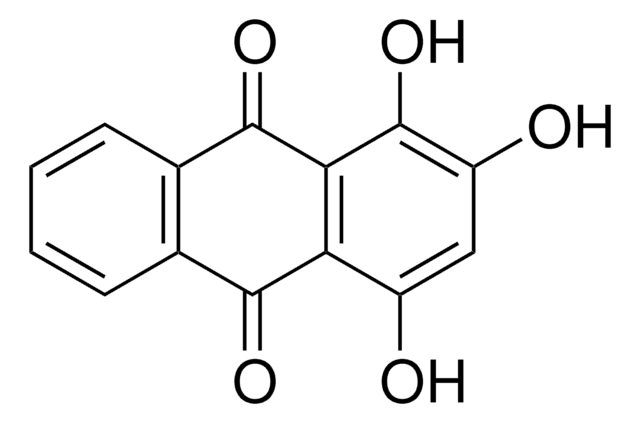195073
Mordant Orange 1
Dye content 70 %
Synonym(s):
Alizarin Yellow R, MO1, 5-(4-Nitrophenylazo)salicylic acid
About This Item
Recommended Products
form
powder
Quality Level
composition
Dye content, 70%
technique(s)
titration: suitable
mp
>300 °C (lit.)
solubility
1 N NH4OH: 1%, clear
λmax
385 nm
ε (extinction coefficient)
≥7000 at 266-276 nm in methanol at 0.006 g/L
application(s)
diagnostic assay manufacturing
hematology
histology
storage temp.
room temp
SMILES string
OC(=O)c1cc(ccc1O)N=Nc2ccc(cc2)[N+]([O-])=O
InChI
1S/C13H9N3O5/c17-12-6-3-9(7-11(12)13(18)19)15-14-8-1-4-10(5-2-8)16(20)21/h1-7,17H,(H,18,19)
InChI key
YVJPMMYYRNHJAU-UHFFFAOYSA-N
Looking for similar products? Visit Product Comparison Guide
General description
Application
Signal Word
Warning
Hazard Statements
Precautionary Statements
Hazard Classifications
Acute Tox. 4 Oral - Eye Irrit. 2
Storage Class Code
11 - Combustible Solids
WGK
WGK 3
Flash Point(F)
Not applicable
Flash Point(C)
Not applicable
Personal Protective Equipment
Choose from one of the most recent versions:
Already Own This Product?
Find documentation for the products that you have recently purchased in the Document Library.
Customers Also Viewed
Our team of scientists has experience in all areas of research including Life Science, Material Science, Chemical Synthesis, Chromatography, Analytical and many others.
Contact Technical Service










